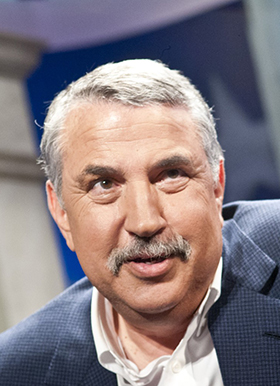
Thomas L. Friedman
Thomas L. Friedman, a three-time Pulitzer Prize winner, best-selling author and foreign affairs columnist for The New York Times, was selected to give the 143rd Commencement address at Washington University in St. Louis in 2004. Friedman received an honorary doctor of laws degree in 2004.
The university’s 143rd Commencement began at 8:30 a.m. May 21 in Brookings Quadrangle on campus. During the ceremony, Friedman also received an honorary doctor of laws.
Friedman opened Washington University’s sesquicentennial year Sept. 17, 2003, when he delivered an Assembly Series lecture and participated in an Arts & Sciences Conversation on “What Kind of International Borders Will Exist in the 21st Century?”
His Commencement address, titled “Imagination,” will mark the close of the university’s yearlong 150th celebration, which included a birthday party open to the St. Louis community and numerous conferences, exhibits, lectures and performances.
Friedman was awarded the 1983 Pulitzer Prize for international reporting (from Lebanon); the 1988 Pulitzer for international reporting (from Israel); and the 2002 Pulitzer for commentary.
He earned a bachelor’s degree in Mediterranean studies from Brandeis University in 1975. During his undergraduate years, he spent semesters abroad at the Hebrew University of Jerusalem and the American University in Cairo. He attended Oxford University on a Marshall Scholarship and received a master’s degree in Modern Middle East Studies in 1978.
After Oxford, Friedman joined the London Bureau of United Press International (UPI) as a general assignment reporter. In 1979, he was dispatched to Beirut as a UPI correspondent.
In 1981, Friedman joined the Times as a financial reporter specializing in news related to oil and the Organization of the Petroleum Exporting Countries. In 1982, he was assigned to be the paper’s Beirut bureau chief, a post he began six weeks before the Israeli invasion of Lebanon.
In June 1984, Friedman was transferred to Jerusalem, where he served as the Times’ Israel bureau chief until February 1988, when he was awarded a Guggenheim Foundation Fellowship to write a book about his reflections on the Middle East. In June 1989, he published From Beirut to Jerusalem, which was on the Times’ best-seller list for 12 months and won the 1989 National Book Award for nonfiction and the 1989 Overseas Press Club Award for the Best Book on Foreign Policy.
From Beirut to Jerusalem has been published in 20 languages, including Japanese and Chinese, and is now used as a basic textbook on the Middle East in many high schools and universities.
In January 1989, Friedman took on a new assignment, this time in Washington, D.C., as the Times’ chief diplomatic correspondent. For the next four years, he traveled some 500,000 miles covering Secretary of State James A. Baker and the end of the Cold War.
In November 1992, Friedman shifted to domestic politics and was appointed chief White House correspondent. He covered the transition and first year of the Clinton administration.
In January 1994, Friedman shifted again, this time to economics, and became the Times’ international economics correspondent, covering the nexus between foreign policy and trade policy. In January 1995, he became the Times’ foreign affairs columnist, only the fifth person in the paper’s history to hold that post.
His second book, The Lexus and the Olive Tree (2000) is a look at globalization: the new international system that, more than anything else, is shaping world affairs today.
In the book, Friedman argues that globalization is not just a phenomenon or a passing trend. It is the international system that replaced the Cold War system. Globalization is the integration of capital, technology and information across national borders in a way that is creating a single global market and, to some degree, a global village.
The Lexus and the Olive Tree won the 2000 Overseas Press Club award for best nonfiction book on foreign policy.
His third book, Longitudes and Attitudes: Exploring the World After September 11, is a collection of his post-Sept. 11 Times columns plus journal commentary. He also wrote the text accompanying Micha Bar-Am’s book, Israel: A Photobiography.
Friedman received the 1987 New Israel Fund Award for Outstanding Reporting From Israel; the 1985 Marine Corps Historical Foundation Award for writing on the history of the Marines; the 1984 New York Newspaper Guild Page One Award; the 1982 George Polk Award; the 1982 Livingston Award for Young Journalists; and the 1980 Overseas Press Club Award.